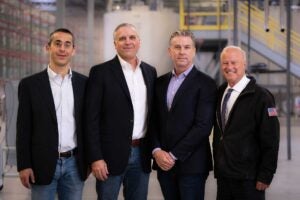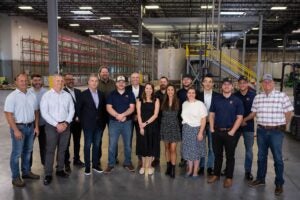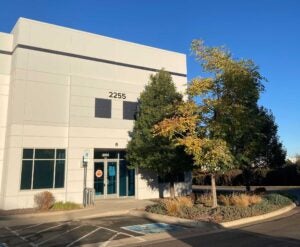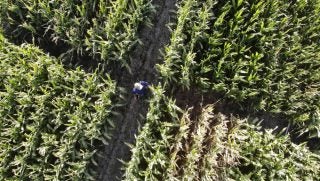AURORA, Colorado — Advancing Eco Agriculture, a regenerative agriculture company based in Middlefield, Ohio, recently opened its doors to a new, 55,000-square-foot manufacturing facility in Aurora capable of serving over 20 million acres of farmland. With many of their clients located in the Pacific Northwest, West Coast, and Midwest, the Colorado location is better poised to serve them by reducing delivery times while reducing environmental impact.
The facility, which opened Sept. 28, will focus on supplying clients with a slew of the company’s liquid fertilizers, all made with non-synthetic ingredients and sourced organically when possible.
John Kempf originally founded the company in 2006 as a crop consulting business after witnessing a huge loss in his family farm’s harvest due to disease and pests. Kempf felt compelled to find a better way to combat the challenges that every farm faces, and sought out plant experts, scientists, and other farmers who could help.
Eventually, this collection of knowledge and practices evolved into Kempf’s company, Advancing Eco Agriculture (or AEA, for short). After several years of consulting, Kempf and his team were frustrated over what they saw as a lack of products that were geared toward overall plant health and resilience — they said they wanted something beyond the niche approaches of pesticides and herbicides.
They then decided to launch their own line of products, which they felt would be most beneficial to farmers in the long run.

Since then, AEA has combined a strong knowledge base from growers, farmers, and other experts with their products to help farms of all sizes thrive.
Some of their most popular products often are synergistic with one another, such as the concentrated fish hydrolysate SeaShield and the soil microbial strengthener Rejuvenate. These are often paired together at the end of a season cycle to replenish soil nutrients and support soil microbes over the winter before replanting.
In addition to consulting and liquid fertilizers, AEA offers crop management programs, plant sap analysis to assess crop health throughout the season, a nitrogen efficiency program to prevent leaching, and many other services and resources.
At the Aurora grand opening, the excitement over expanding AEA’s operations was palpable, with company employees, collaborators, and stakeholders gathered to see the new facility and hear from board members.
While founder Kempf was unable to be present at the ribbon cutting, that didn’t put a damper on the enthusiastic and celebratory atmosphere, which included a complimentary espresso bar, mimosas, and fresh artisan pastries.
In the opening speech, CEO Jason Hobson spoke about farmers struggling to ensure an adequate yield on their farmland, which he blamed on a dependence on synthetic fertilizers and pesticides.
Knowing that there’s no magic bullet that solves all problems, Hobson emphasized that America’s current food system is “broken” and that “the way we farm, the way we grow food, [just] doesn’t work anymore.”
However, Hobson also spoke of hope on the horizon for companies like his. As a slew of problems has battered the agricultural sector, from climate change to water rights, the call for regenerative agriculture has grown.
While no formal definition of “regenerative agriculture” exists, the consensus centers around improving soil health, water usage, and farm sustainability — cover crops and reduced- or no-till systems generally are considered “regenerative.” According to Google Trends, the term “regenerative agriculture” has been steadily gaining interest from consumers, farmers, and investors. And companies are getting involved, too. Recently, for example, General Mills and Walmart announced a new collaboration that aims to help accelerate the adoption of regenerative agriculture on 600,000 acres in the U.S. by 2030.
As one of the pioneers of regenerative agriculture, AEA is poised to help lead the initiative to transition many farms toward more regenerative and/or sustainable practices. With over 10 thousand farmers served across 4 million acres of farmland, AEA is helping farmers see that there is a future in what they are doing.
Hobson said that one of the most rewarding aspects of the job is “seeing farmers have fun farming again, instead of feeling like it’s something they have to do.”
While the term “regenerative agriculture” has received criticism and been stigmatized by some growers, largely because of how inconsistently it is defined, the approach ultimately tries to promote a sustainable practice of farming that is beneficial for the farmer, the consumer, and the future. To this end, AEA is doing its’ best to address grower needs wherever they are, in whatever practices they engage in.
Kish Johnson, Director of Sales for AEA, cites a three-point strategy in how the company’s consultants do this. Firstly, the company prides itself on its open source education — interested farmers can peruse the company website to access resources, management guides, and even a podcast that Kempf records where he interviews industry leaders and experts.
By making information and knowledge accessible, Johnson hopes to convey to farmers that AEA is seeking to collaborate with and support growers, not simply instruct them.

Secondly, Johnson stresses that many consultants are from farming backgrounds themselves, and can connect with clients from a “pain point” of understanding the frustration and disappointment that many farmers face today. By showing vulnerability, Johnson believes that the company can establish a genuine connection with farmers.
Lastly, Johnson knows that, ultimately, farmers seeking AEA’s consultation need access to a larger knowledge base than what they currently have. By pooling the best farming practices from nearly 20 different consultants on the team, AEA ensures that there is something that can help a farmer with whatever issue they have at hand.
Johnson knows how the term “regenerative” is often viewed in the producer community, where many farmers already feel that their practices are what’s best for their soil and their farm. That’s why Johnson stresses how important it is to meet farmers where they are and promote what changes will be acceptable to them.
“Ultimately, it’s less about the label of ‘regenerative’ and more about the practice itself, whatever that looks like for the farmer,” Johnson said.
AEA’s commitment to farmers growing better and more sustainably goes above and beyond, as showcased by their latest collaboration with Citizens of Humanity, a denim company that, according to its website, “Decided to go straight to the source: cotton farms,” for their supply.
By collaborating with cotton growers such as James Johnson, a fourth-generation farmer in New Mexico, AEA hopes to not just help farmers boost their production while maintaining soil health but also give them a leg up in where they sell their products.
James Johnson, present at the grand opening in Aurora, expressed enthusiasm and pride in AEA’s expansion, and recounted the story of how he initially met Kempf and connected with him over their passion of practicing agricultural products sustainably.

From growers to the mayor of Aurora, everyone attending the grand opening was keen to see the company expand and place roots in a location poised perfectly to serve more clients. Nestled in a plaza with other manufacturing facilities, and across the street from a park, the facility boasts an impressive space for production, while maintaining a cozy and inviting lobby for clients to swing by.
By acting as a middleman to identify growers who can provide high-quality cotton for fashion labels, AEA is cultivating a transparent pipeline from start to finish where they hope each partner can earn an equitable cut.
Ultimately, Advancing Eco Agriculture supports farmers, growers, and those in the agriculture industry in as many ways as they can. The launch of a larger facility in Aurora is the first of many steps in this company’s mission to deliver expert advice, quality products, and open communication in the agricultural industry.
Liza Thuy Nguyen serves as the 2023 American Farmland Trust Agriculture Communications Intern at AGDAILY, with a focus on helping to amplify diversity and minority voices in agriculture. Liza is originally from Anaheim, California, and attended the University of California, Davis, as a first-generation college student. She received a bachelor’s degree in genetics and genomics and went on to earn a master’s in horticulture from Penn State.



